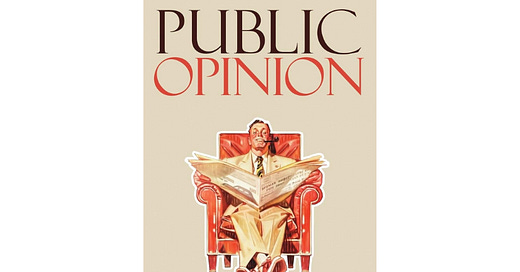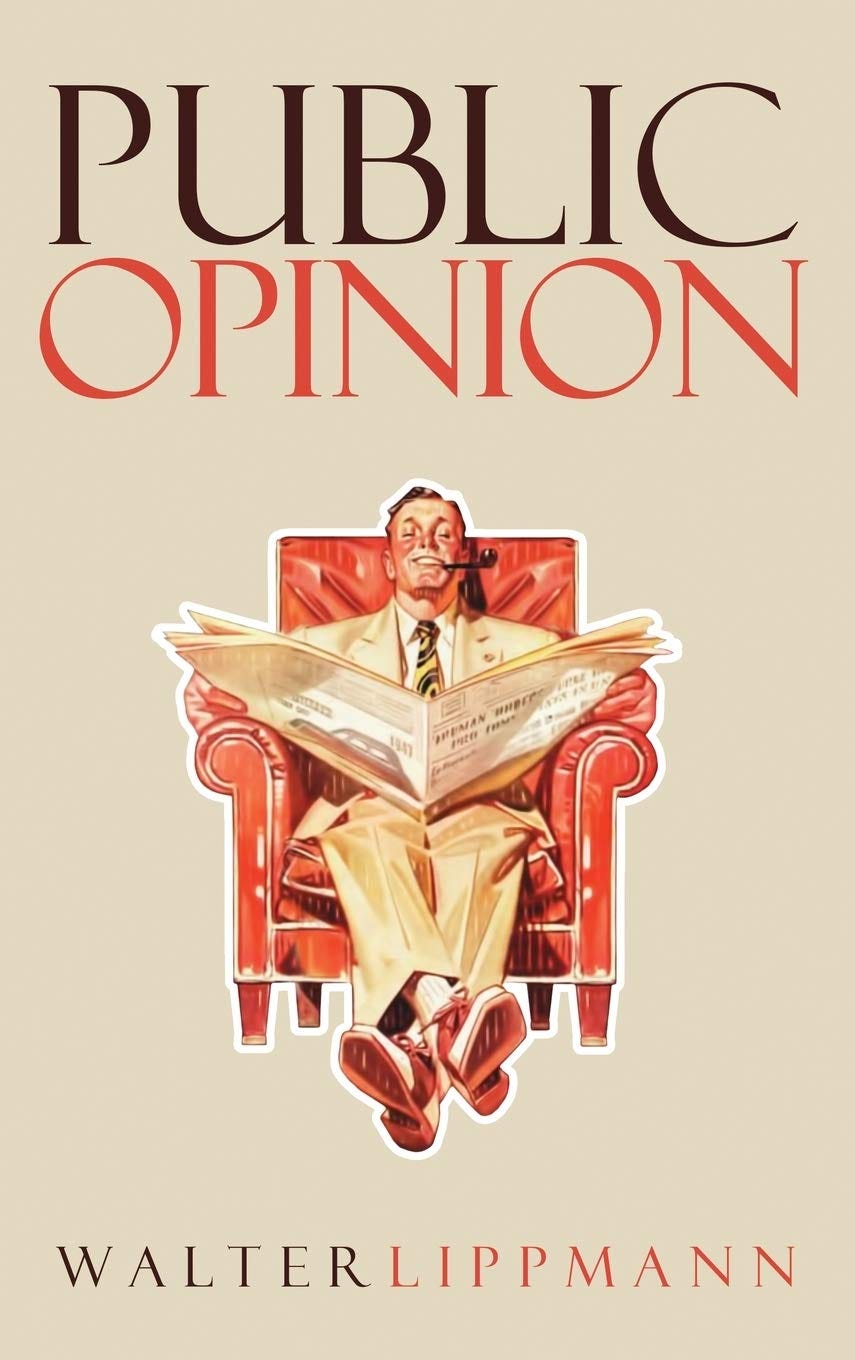Welcome to Citizen Scholar! Since launching four months ago we’re reaching hundreds of people a week, so we thank you for your support. If you enjoy our writing on civic virtue and individual excellence, we humbly ask you to share Citizen Scholar with your family members and friends who may enjoy it. The contents of the audio and text formats are identical and meant to accommodate your preferences. Please let us know if you have any feedback - we’re always looking for ways to improve!
Introduction
This year marks the one hundredth anniversary of the publication of Public Opinion. Walter Lippmann’s ideas resonated in his own time and proved foundational to future understandings of Western media and political structures. During his long career as a journalist, he accumulated numerous accolades. Lippmann helped with the American propaganda effort in World War I, cofounded The New Republic, won two Pulitzer Prizes and helped popularize the term “Cold War” after World War II. In his books, Lippmann rose to the level of serious lay political philosopher.
In Public Opinion, he did more than just coin the terms stereotype and manufacturing consent as we currently understand them. Lippman analyzed how citizens process information and develop a worldview. He concluded that democracies could not and in practice did not operate based on the full, informed consent of citizens. Even so, Lippman advocated for improving their function by instituting bodies of highly trained intelligence and analysis agencies. They could come as close to the complete and precise truth as possible to advise both government decision makers and the press (and thus the people).
Critique of Democratic Theory’s Assumptions
Democratic theory was well understood by Lippmann’s time. He attacks its assumptions in this book effectively enough that even John Dewey, the well-known American philosopher, psychologist and educational reformer, accepted many of his criticisms without accepting Lippmann’s alternative policy recommendations. According to Lippmann, democratic theorists went wrong in looking for premises to support the conclusion that all people could spontaneously manage their own public affairs.
Having adopted the premise because it was necessary to their keenest hope, they drew other conclusions as well. Since in order to have spontaneous self-government, you had to have a simple self-contained community, they took it for granted that one man was as competent as the next to manage these simple and self-contained affairs. Where the wish is father to the thought such logic is convincing. Moreover, the doctrine of the omnicompetent citizen is for most practical purposes true in the rural township. Everybody in a village sooner or later tries his hand at everything the village does. There is rotation in office by men who are jacks of all trades. There was no serious trouble with the doctrine of the omnicompetent citizen until the democratic stereotype was universally applied, so that men looked at a complicated civilization and saw an enclosed village.
Not only was the individual citizen fitted to deal with all public affairs, but he was consistently public-spirited and endowed with unflagging interest. He was public-spirited enough in the township, where he knew everybody and was interested in everybody’s business. The idea of enough for the township turned easily into the idea of enough for any purpose, for as we have noted, quantitative thinking does not suit a stereotype. But there was another turn to the circle. Since everybody was assumed to be interested enough in important affairs, only those affairs came to seem important in which everybody was interested.
This meant that men formed their picture of the world outside from the unchallenged pictures in their heads. These pictures came to them well stereotyped by their parents and teachers, and were little corrected by their own experience. Only a few men had affairs that took them across state lines. Even fewer had reason to go abroad. Most voters lived their whole lives in one environment, and with nothing but a few feeble newspapers, some pamphlets, political speeches, their religious training, and rumor to go on, they had to conceive that larger environment of commerce and finance, of war and peace. The number of public opinions based on any objective report was very small in proportion to those based on casual fancy.
Lippman dedicates chapters to how men are in fact, quite the opposite of omnicompetent or even well-informed. Consequently, democracies are de facto run by webs of formal and informal institutions with hierarchies that employ force, patronage and privilege.
Most people in the modern world effectively live in a community too big for an individual to know everyone and everything that happens. The only concept people have of the world beyond their immediate perception is a constructed mental image. A myriad of external factors heavily impact and skew this mental image. These include, but are not limited to:
The censorship of information – Lippman gives shocking examples of how much citizens were lied to about casualty counts and the progress of battles in World War I
Information that remains private
The scarcity of time and attention citizens allot to understanding the world
The sheer velocity of information flow
Imperfect or deceptive wording and clarity of information
The influence of stereotypes, moral codes and blind spots – this portion of Lippman’s argument reads like common knowledge, but was novel at the time of writing in 1921-1922
The influence of conflicting interests
The Un-Democratic Reality
According to Lippmann, the consequences of these distorting or limiting factors is the insertion between a man and his environment of a “pseudo-environment” that he adopts as his mental image of reality. He believes that almost no one is equipped to deal with the world’s infinite subtlety. This pseudo-environment ends up as a hybrid of that person’s nature interacting with the perceived environment. Lippmann explains how this is the ultimate driver of Public Opinion below:
Those features of the world outside which have to do with the behavior of other human beings, in so far as that behavior crosses ours, is dependent upon us, or is interesting to us, we call roughly public affairs. The pictures inside the heads of these human beings, the pictures of themselves, of others, of their needs, purposes, and relationship, are their public opinions. Those pictures which are acted upon by groups of people, or by individuals acting in the name of groups, are Public Opinion with capital letters.
Lippmann rejects the idea of “group minds”. If the individual mind forms poorly in this way, then the outcomes produced by the democratic process are likely to be flawed. And of course, there are always flawed outcomes to be observed in the democratic process. Those of us raised with democratic values can recognize some of the merits in Lippman’s critique while still cringing at these undemocratic sentiments.
Our view at Citizen Scholar is that some of Lippmann’s criticisms ring true a century later and represent room for improvement. However, there is still value in democratic accountability. People may have an imperfect understanding of the world, but they tend to be best informed about their own interests. It’s already a major win when they have mechanisms in place to form institutions that protect and further those interests and to hold these institutions accountable. Institutional capture or drift – which Lippman lays out in detail – is inevitable in a world inhabited by imperfect human beings. History doesn’t present an example of a more sustainably effective form of government for promoting the average citizen’s interest than the democratic one. Lippmann gets around this problem by conceding that he believes human beings could rise to higher natures than historical case studies suggest:
For we do not know how men would behave in response to the facts of the Great Society. All that we really know is how they behave in response to what can fairly be called a most inadequate picture of the Great Society. No conclusion about man or the Great Society can honestly be made on evidence like that.
Baked into this statement are two assumptions: that perfect information is attainable and that human beings are infinitely improvable. We’re highly skeptical. These core questions remain unanswered since at least Socrates’ time. An adequate philosophical treatment is outside the scope of this post, but the empirical evidence of history and human biology points in our favor.
Consciously Shaping Public Opinion
Lippmann believed that in his own time, a revolution was underway in the “top-down” shaping of Public Opinion. Institutional leaders in the public and private sectors dedicated more energy to propaganda, in the neutral sense of the word. Many also employed publicity agents, now called public relations professionals. Publicity bureaus filtered information for the press, who provided external and unreliable images for the citizen’s pseudo-environment. Lippmann also critiques other well-known flaws in the press’ ability to provide objective and complete truth. While he agrees that Public Opinion can’t be left to organic formation and must be shaped from above, he proposes an alternative structure.
Lippmann dedicates the last portion of the book to this vision. Put simply, he advocates for the proliferation of expert intelligence agencies embedded in political and industrial institutions. He acknowledges their nucleic existence within agencies like the Census Bureau and State Department at the time, but believes that they were still inadequately organized and underappreciated. Experts staffing these bodies can come as close as possible to an objective and complete truth. This information, in turn, passes to decision makers. These decision makers no longer need to apprehend the truth themselves or with the help of imperfect staff; instead they can simply act on readily available information.
Lippmann’s enthusiasm for this seemingly noble and enlightened solution captures the attitudes of the Progressive Era. To the extent that he influenced people who tried to implement it, these recommendations have had mixed results at best. The examples of poor outcomes from obeying expert agencies are legion, from the Federal Reserve’s historical inflation management to the shifting positions of the NIH and CDC. We don’t hold Lippmann completely accountable for this, as he did warn how these new structures could spin out of control without the proper controls. In this sense, he joins the ranks of other great thinkers whose concepts were enthusiastically adopted without regard to their warnings and preconditions. Adam Smith and Vilfredo Pareto come to mind. Even so, he failed to recognize the inevitability of fallible human beings neglecting these controls.
Our most important takeaway from studying Lippmann’s proposed solutions to the problem of Public Opinion is the need to understand the exact extent to which he influenced later developments. He’s been heavily cited by thinkers like Bernays and Chomsky, but we would love to better understand how later shapers of Public Opinion and implementers of expert agencies understood Lippmann. We’d especially like to know the extent to which today’s authorities actively harbor ideas similar to his. Stay tuned for future posts on material that we may find. If you, the beloved reader, have any recommendations, please send them our way.
All the best,
The Citizen Scholar Team














Share this post